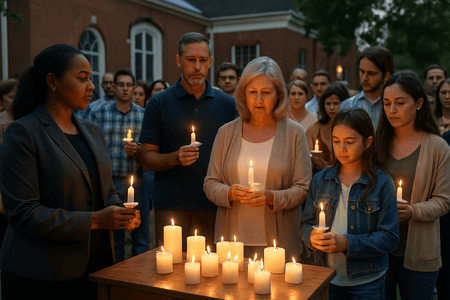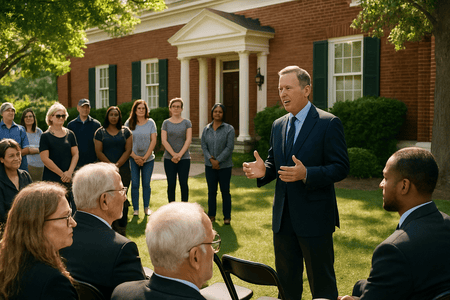Community Outreach by Funeral Homes

Virtual Tours of Funeral Homes
May 13, 2025
Choosing a Pet-Friendly Funeral Home
June 1, 2025Funeral homes hold a unique place in the fabric of local life. Families often meet them during the hardest moments—but their presence in the community extends far beyond services and ceremonies. The most impactful funeral homes don’t just serve individuals in mourning—they support neighborhoods through education, outreach, and compassionate connection.
Whether they’re hosting grief workshops, partnering with schools, or organizing volunteer events, their role has shifted toward proactive, community-centered care. In the sections ahead, you’ll see how these programs make a difference—for the families they serve and the towns they call home.
Why Community Involvement Matters for Funeral Homes
Trust isn’t built overnight. For funeral homes, it often starts long before someone walks through the door needing help. Regular involvement in the community lays the foundation. It shows families that the staff cares—not just during moments of loss, but every day.
Events like pre-planning seminars, grief talks, or school outreach programs make funeral homes feel familiar, not distant. They also reflect a modern shift: families today want to connect with businesses that genuinely invest in their communities. That shift isn’t about marketing—it’s about showing up, being present, and leading with empathy.
Common Community Outreach Activities by Funeral Homes
Grief Support Groups and Workshops
Grief doesn’t follow a set schedule. Long after the funeral ends, many people still need help navigating loss. Funeral homes that offer grief workshops or support groups give families a safe place to process those emotions—often at no cost. Some host monthly drop-in sessions. Others create seasonal programs around the holidays, when grief can feel especially heavy.
A few even partner with grief counselors to offer structured seminars. These events aren’t only for families they’ve served. Anyone in the community is welcome. That openness turns funeral homes into places of comfort, not just ceremony.
Educational Events and Public Talks
Many families avoid planning until they’re forced to. Funeral homes that host public talks and pre-planning seminars help break that cycle. Whether it’s a session on end-of-life paperwork, a Q&A on cremation options, or an overview of estate planning, the goal stays the same: give people knowledge before they’re overwhelmed by decisions.
Some homes hold quarterly sessions at their chapel. Others visit local libraries or senior centers to bring education into trusted spaces. The best events feel more like conversations than presentations—open, honest, and practical.
Charity and Volunteer Involvement
A strong local presence means showing up for more than clients. Funeral homes often take part in fundraisers, food drives, and neighborhood cleanups. Some even sponsor 5Ks or donate to shelters in memory of families they’ve served.
Others organize their own events—like a winter coat drive or school supply drop-off—inviting staff and families to get involved. That hands-on support shows the community that the funeral home doesn’t just work in the neighborhood. They’re part of it.
Youth and School Programs
Conversations about loss don’t always reach kids until it’s too late. Funeral homes are stepping up with school programs, scholarships, and youth-centered grief education. Some create partnerships with counselors to bring age-appropriate materials into classrooms. Others sponsor writing contests or art exhibits focused on remembrance.
A few even host summer camps for grieving children, blending emotional support with creative expression. These programs don’t just support kids—they offer peace of mind to parents and build lasting ties between generations.
Benefits of Community Outreach for Families and Funeral Homes
Strengthening Community Connections
When funeral homes step outside their walls to support the wider community, they become more than service providers. They become familiar faces. That connection matters—especially during times of grief, when families need comfort and trust. Outreach builds that familiarity long before a family ever walks through the doors.
Small acts add up. A local seminar on estate planning, a neighborhood candlelight vigil, a grief art workshop—all show that the funeral home isn’t just in the community. They’re for it.

Providing Grief and Emotional Support
Grief doesn’t wait for business hours. Support should feel just as personal as the loss itself. Outreach efforts—like drop-in grief sessions, seasonal remembrance events, or school partnerships—offer ways to cope that feel natural and accessible.
Some families may not need a full counseling program. Others might not know where to begin. When funeral homes host gentle, community-based events, they create opportunities for healing that meet people where they are, not where someone else thinks they should be.
Enhancing Reputation and Local Leadership
Outreach isn’t about marketing. It’s about presence. When a funeral home consistently shows up for community needs—whether it’s organizing food drives, sponsoring memorial scholarships, or leading grief education in schools—they position themselves as dependable, compassionate leaders.
People remember those efforts. And when the time comes to choose a funeral provider, they gravitate toward names they already trust. Outreach doesn’t just improve reputation—it defines it.
How Families Can Participate or Benefit from Local Funeral Home Programs
Attend Grief Support Events
Many funeral homes host grief workshops, seasonal memorials, and drop-in support groups that are open to the community. Some run year-round, others mark occasions like holidays or anniversaries. These gatherings offer space to reflect and connect—without pressure, judgment, or expectations.
Attending just one session can make a difference. For families navigating loss, that small step often opens the door to deeper healing.
Join Charity and Volunteer Opportunities
Funeral home volunteer programs often support causes tied to remembrance, wellness, or community care. Think food drives, blood donation events, or walks in memory of loved ones. Families who’ve experienced loss sometimes find meaning in giving back, especially when the event honors a life that mattered to them.
Joining in doesn’t require a huge commitment. Just showing up counts—and being part of something collective often helps grieving families feel less alone.
Connect with Staff for Resources
Funeral staff often know more than people expect. Whether it’s finding a local therapist, joining a grief support group, or accessing a pre-planning seminar, they can usually point you in the right direction.
Families don’t need to wait for a service to ask for help. Reaching out for resources—early, or long after a loss—can lead to the kind of support that’s hard to find elsewhere.

